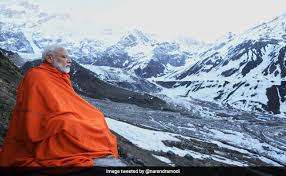After the culmination of the Lok Sabha poll campaign, Prime Minister Narendra Modi arrived in Kanniyakumari where he will meditate for 45 hours from Thursday evening.
Swami Vivekananda attained salvation at Kanniyakumari
Security has been beefed up ahead of PM Modi's visit and 2,000 police personnel will stand guard during his stay, even as the Indian Coast Guard and Indian Navy will also maintain a tight vigil.
PM in 45-hour meditation session in Kanniyakumari, liquid-only diet: Sources
Narendra Modi on Thursday, May 30, reached the famous Vivekananda Rock Memorial in Tamil Nadu’s Kanniyakumari, India’s southernmost tip, ahead of his 45-hour-long meditation.
PM's spiritual retreat comes at the end of campaigning for the Lok Sabha election.
Varanasi goes for voting on June 1. Modi is seeking election from the constituency for the third time in a row.
He will meditate for nearly 45 hours from the evening of May 30 until the evening of June 1 at the Dhyan Mandapam, the place where spiritual leader Swami Vivekananda meditated 131 years ago.
Upon his arrival, the Prime Minister headed straight to the Bhagavathi Amman temple and offered prayers. Clad in a dhoti and a white shawl, PM Modi prayed at the temple and circumambulated the 'garbhagriha' (sanctum sanctorum). Priests performed a special 'arthi' and he was given the temple 'prasad' that included a shawl and a framed photograph of the presiding deity of the temple.
PM Modi is known to undertake spiritual journeys at the end of election campaigns. In 2019, he visited Kedarnath, and in 2014 he visited Shivaji’s Pratapgarh.
"Modi ji is somewhere in between a Sanyasi and a Raja -- here a benevolent king committed to uplift of millions of Indians and taking Bharat, that is India, to a new era of Viksit Bharat by 2047 when India will complete 100 years as an independent nation after the end of colonial rule," said an enthusiastic BJP worker in Kanniyakumari.
In 2019 Modi, dressed in saffron robes, was photographed meditating in a holy cave near Kedarnath.
According to Hindu beliefs, the Vivekananda rock was also the place where Goddess Kanniyakumari (Parvati) performed penance in devotion to Lord Shiva. A small projection on the rock is believed to be an imprint of her foot, adding to the religious significance of the site.
The Lok Sabha election is being held in seven phases beginning on April 19, and the results will be out on June 4.
PM Modi and the BJP hope to return to power with a performance exceeding their count in 2019.
Some anecdotes and information:
Hindu meditation is also known as yoga. While many people practice yoga without practicing Hinduism, yoga is rooted in the religion. There are two styles of yoga, hatha yoga and kriya yoga—one focuses on the physical and one focuses on breathing and energy.
In Autobiography of a Yogi, Paramahansa Yogananda—a famous yoga practitioner and teacher—briefly explains yoga’s core practices.
These include physical, mental, and behavioral disciplines collectively called the Eightfold Path of Yoga (sometimes called the Eight Limbs of Yoga).
Note that while one of the steps of the Eightfold Path is itself meditation, the other practices can help you meditate more effectively.
Yama: behaviors to avoid. The five Yamas are violence (in action, speech, and thought), lying, stealing, sex, and greed. These are selfish behaviors that cause you to focus on yourself instead of God, and therefore block you from reaching enlightenment.
Niyama: good deeds, or duties to observe. The five Niyamas are cleanliness, contentment, discipline, learning, and devotion to God. These practices create a healthy physical and mental environment, allowing you to more effectively seek God.
Asana: posture. Holding yourself in a stable and comfortable position allows for extended meditation. This helps you to build physical strength and discipline, thereby gaining better control over your own body.
Pranayama: breathing exercises. Controlling your breathing helps you to strengthen your discipline and deepen your meditation.
Pratyahara: inward focus. This means detaching your senses from the outside world. Directing all your attention to your own thoughts and moment-to-moment experiences helps you to build mindfulness and gain a greater understanding of yourself.
Dharana: concentration. This involves focusing on a single thought for extended periods of time, which helps you build mental strength and discipline.
Dhyana: meditation. This is a state of calm and focus that you can achieve by practicing Dharana.
Samadhi: expanded consciousness. This is an all-seeing, all-knowing state of bliss achieved by temporarily joining your consciousness to God.
Yogis like Yogananda say that samadhi requires years of intense, dedicated training to achieve.
ends









No comments:
Post a Comment